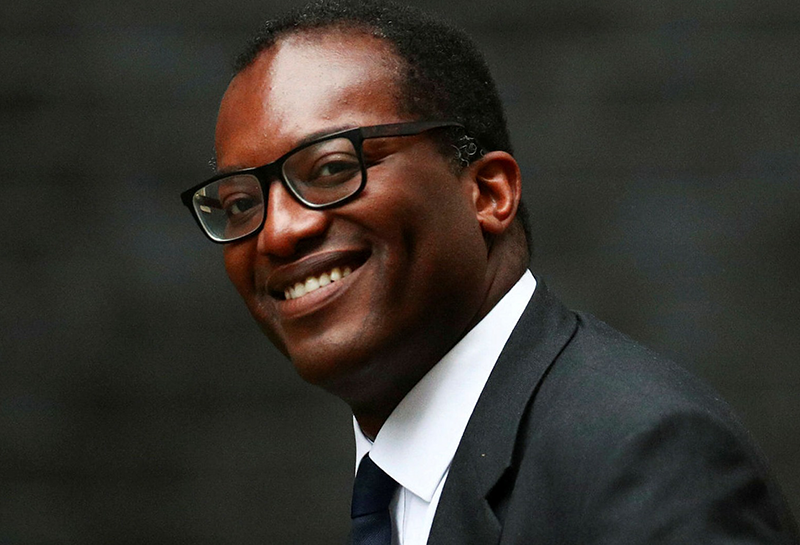British Prime Minister Liz Truss Appointed Kwasi Kwarteng as Britain’s First Black Finance Minister and James Cleverly as the First Black Foreign Minister
By Abdul Rahman Bangura–

Kwasi Kwarteng as Britain’s First Black Finance Minister
Photo Credit: thetalk.ng
NEW AFRICA BUSINESS NEWS (NABN) Freetown, Sierra Leone – Kwasi Kwarteng parents were from Ghana in the 1960s, while Cleverly’s mother hails from Sierra Leone and whose father is white, has in the past spoken about being bullied as a mixed race child and has told the party needs to do more to attract Black voters.
Suella Braverman, whose parents migrated to Britain from Kenya and Mauritius six decades ago, succeeds in Priti Patel as the second Ethnic Minority Home Secretary, or Interior Minister, where she will be responsible for police and immigration.
The increasing variety is in part thanks to an impetus by the Conservative Party in contemporary years to put forward a more mixed set of candidates for parliament. British administrations have until a few decades ago been made up of mostly white men. It took until 2002 for Britain to appoint its first Ethnic Minority Cabinet Minister when Paul Boateng was appointed Chief Secretary to the Treasury.
Rishi Sunak, whose parents came from India, was Kwarteng’s forebear in the finance job and the runner-up to Truss in the leadership context.
“Politics has set the pace. We now treat it as normal, this diversity,” said Sunder Katwala, Director of Non-Partisan think-tank British Future, which focuses on migration and identity. “The pace of change is extraordinary.”
Nonetheless, the upper ranks of migration the judiciary, the civil service and army are all still predominately white. And despite the party’s diversity campaign, on a quarter of Conservative members of parliament, are women and 6% from minority backgrounds. Critics similarly brought up that, there was little diversity in the Conservative ranks when it came to education and class, with the exclusive Eton College and universities of Oxford and Care Ambridge still serving as a supply line for its members and government ministers.
Nevertheless, the Conservatives have the best track record of political firsts amongst the main political parties, including appointing the first Jewish Prime Minister in Benjamin Disraeli in 1868. This is despite the fact Ethnic Minority voters are much more plausible to support the opposition Labor Party and the ruling party has encountered indictments of racism, misogyny and Islamophobia.
Former Prime Minister Boris Johnson admitted guilt in 2019 for defining Muslim women wearing burqas as looking like letter boxes.
The Conservatives have elected all three of Britain’s female prime ministers, Margaret Thatcher, Theresa May and now Truss. The first lawmaker of Asian descent, Mancherjee Bhownaggree 1895 also came from the Conservatives.
Johnson compiled the youngest and most ethnically eclectic Cabinet in history when he was elected Prime Minister in 2019. His three Finance Ministers incorporated two men of South Asian origin and one of Kurdish background. The modifications pursued a years-long effort by former leader and Prime Minister David Cameron.
When he took over in 2005, the party had just two Ethnic Minority fellows of parliament out of 196, and he set out to assure that, his party more nearly approximated the modern Britain it dreamed to govern.
The following year, Cameron inaugurated a priority list of female and minority candidates to be selected, many for safe seats in the House of Commons. Truss was a beneficiary of this push.
“A key part of ensuring the strength and resilience of any group, including a political party, is the avoidance of everyone thinking and acting in the same way — the avoidance of group-think,” said James Arbuthnot, a member of the party board’s committee on candidates when Cameron introduced the changes.
But Kwarteng has played down the importance of his ethnicity. He has said that, although he encountered racist affronts growing up in the eighties, he does not see himself as a symbol of anyone other than his constituents in Spelthorne, which abuts London’s South-West suburbs.
“I actually think that it’s not that much of a big deal,” after being appointed as the first Black Conservative front-bench minister. “I think once you’ve made the point, I don’t think it’s something that comes up that much.”
For New Africa Business News (NABN) Abdul Rahman Bangura Reports, Africa Correspondent
